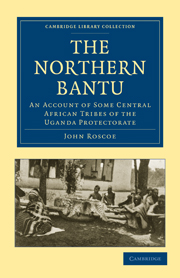Book contents
- Frontmatter
- PREFACE
- Contents
- LIST OF ILLUSTRATIONS
- Uganda and British East Africa
- PART I THE BANYORO A PASTORAL PEOPLE
- CHAP. I THE COUNTRY, THE PEOPLE, THE KING
- CHAP. II GOVERNMENT
- CHAP. III CLANS, TOTEMS AND TERMS OF RELATIONSHIP
- CHAP. IV MARRIAGE AND BIRTH
- CHAP. V SICKNESS AND DEATH
- CHAP. VI INDUSTRIES
- CHAP. VII WARFARE
- CHAP. VIII HUNTING, DRUMS AND THEIR USE
- CHAP. IX RELIGIOUS BELIEFS
- PART II THE BANYANKOLE A PASTORAL TRIBE OF ANKOLE
- PART III THE BAKENE, LAKE DWELLERS
- PART IV THE BAGESU A CANNIBAL TRIBE
- PART V THE BASOGA
- PART VI NILOTIC TRIBES. THE BATESO AND THE KAVIRONDO
- INDEX
- PUBLICATIONS OF THE CAMBRIDGE UNIVERSITY PRESS RELATING TO AFRICA
- Plate section
CHAP. VIII - HUNTING, DRUMS AND THEIR USE
Published online by Cambridge University Press: 07 September 2011
- Frontmatter
- PREFACE
- Contents
- LIST OF ILLUSTRATIONS
- Uganda and British East Africa
- PART I THE BANYORO A PASTORAL PEOPLE
- CHAP. I THE COUNTRY, THE PEOPLE, THE KING
- CHAP. II GOVERNMENT
- CHAP. III CLANS, TOTEMS AND TERMS OF RELATIONSHIP
- CHAP. IV MARRIAGE AND BIRTH
- CHAP. V SICKNESS AND DEATH
- CHAP. VI INDUSTRIES
- CHAP. VII WARFARE
- CHAP. VIII HUNTING, DRUMS AND THEIR USE
- CHAP. IX RELIGIOUS BELIEFS
- PART II THE BANYANKOLE A PASTORAL TRIBE OF ANKOLE
- PART III THE BAKENE, LAKE DWELLERS
- PART IV THE BAGESU A CANNIBAL TRIBE
- PART V THE BASOGA
- PART VI NILOTIC TRIBES. THE BATESO AND THE KAVIRONDO
- INDEX
- PUBLICATIONS OF THE CAMBRIDGE UNIVERSITY PRESS RELATING TO AFRICA
- Plate section
Summary
Agricultural people only hunt animals for food. We should scarcely expect a pastoral people to be hunters, their life is so contrary to that of a hunter. The meat of most wild animals is forbidden them, which at once limits the object of hunting to pure sport and leaves the wider aim of obtaining food from the chase to people of agricultural clans. On the other hand it is customary to hunt beasts of prey not only from the love of sport, but also from necessity, that is, when lions and leopards become dangerous to the herds. The herdsmen never hesitate to hunt them and show no lack of courage during the hunts: they will face the fiercest lion and spear it as they would the most timid animal. Hunting is therefore in the main limited to members of agricultural clans and is engaged in by them for the sake of meat, there being few men who make the chase their principal calling in preference to other work.
Elephant hunting. When hunting elephants, the huntsman first discovers the locality of a herd and chooses one or two trees in the track the animals will be likely to take to go to water. He climbs one tree and his companions climb other trees near, hide in the branches and wait until the animals pass under them, when they spear the animal chosen, if possible between the shoulders, and withdraw the spear if they can.
- Type
- Chapter
- Information
- The Northern BantuAn Account of Some Central African Tribes of the Uganda Protectorate, pp. 85 - 88Publisher: Cambridge University PressPrint publication year: 2010First published in: 1915



